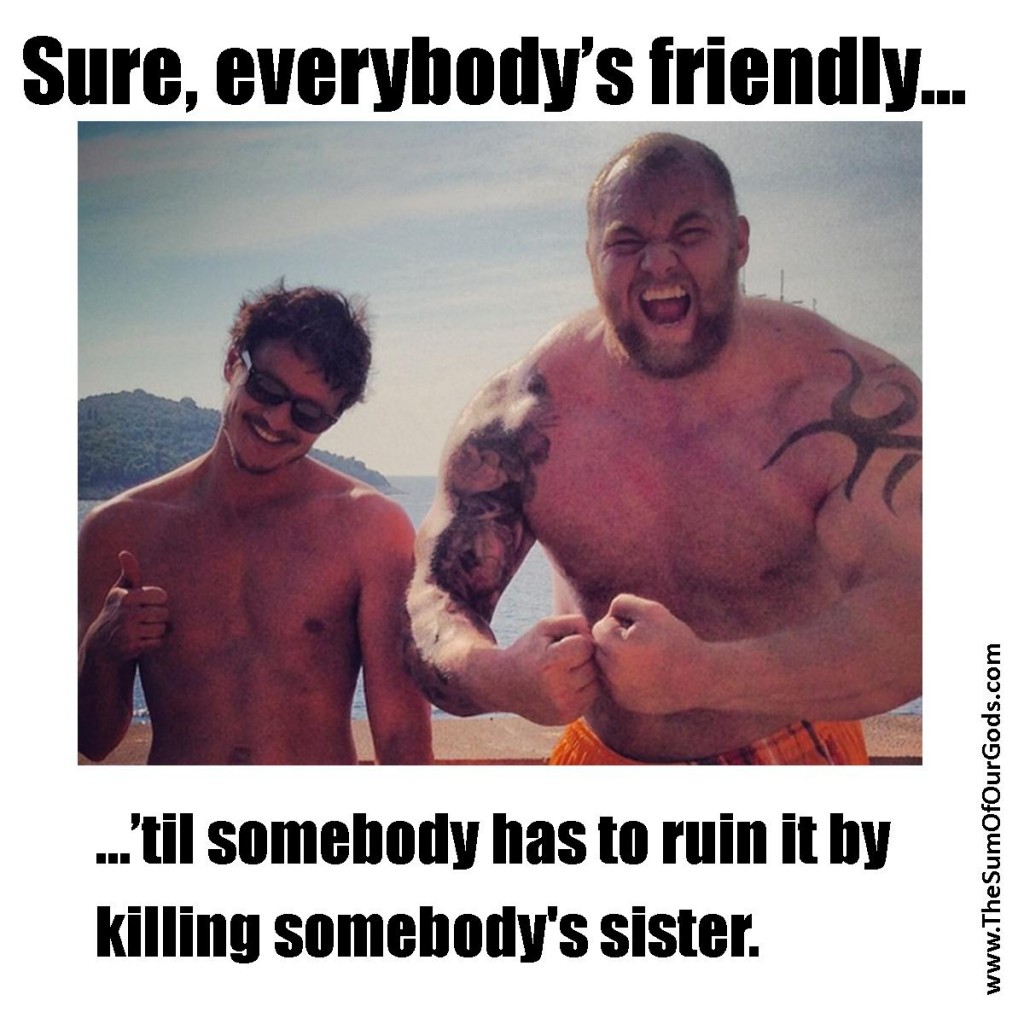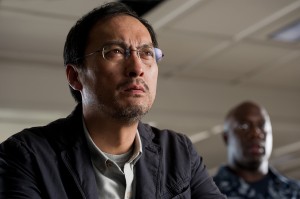Fun With Really Big Numbers: We Can Totally Afford to End Extreme Poverty in the United States
/Today I was listening to Mike Pesca on Slate's The Gist podcast, and he had an interesting riff on Michael Bloomberg. Apparently Bloomberg recently received a prize for a million dollars and was kind enough to give it back to fund ten more prizes for $100,000 a piece for other do-gooders. Nice, right? But here's what Pesca figured out: For Michael Bloomberg's, one million dollars is .003058% of his wealth. Pesca points out that, for a millionaire, a prize of equivalent size would be $30.58. I did a rough calculation to figure out what this equivalent prize would be to me. Michael Bloomberg getting one million dollars is roughly like me getting $1.38 cents added to my annual pre-tax pay. Obviously I'm not a millionaire. But this got me thinking. Specifically, it got me thinking about a point Matthew Yglesias has repeatedly made over in Slate's Moneybox column. Yglesias is persuaded, and has persuaded me, that direct cash payments to poor people are actually the most effective way to confront poverty. It turns out that if we stop condescending to poor people and blaming them for their misery, and actually trust them to make rational decisions about how to improve their lot in life, they make better ones than the people who think they are incapable.
So, just how much money could someone like Michael Bloomberg give to poor people? Here's what I've come up with. [Note: I'm no math whiz, so if I've done any of this incorrectly, please let me know.]
Let's say we only focused our poverty-fighting in the U.S. I know that's jingoistic and also inefficient since a dollar goes a lot further towards fighting poverty in a much poorer country. But it's easy to relate to our fellow citizens, and you'll see at the end why this gets really interesting.
So, there are 313.9 million people living in the United States, according to Google (which probably knows better than anyone, including the government).
Now, a billion is a huge number. It's difficult to wrap your mind around. Imagine a briefcase with a thousand dollars in it. Not too hard to picture, right? Now imagine a thousand of those spread out on a football field or a mall parking lot. Already getting hard to picture, right? Now imagine stacking 999 more briefcases on top of each of those. That's a lot of cash.
It gets easier when you think about how much that is for each of us. If you divided that cash in that parking lot up among all the people in the country, it's $3.19 for each person. That's not just every working adult. That's every baby, every geriatric great-grandma. Everybody. But it's only $3.19.
Big deal, right?
But what if Michael Bloomberg decided to spend only half his wealth by giving it directly to everyone (not counting the cost of postage)? We have to leave him with some money of his own, right? So just half his wealth.
That's $60.85.
All of it?
$121.65 per American.
Still not that big a deal, right?
But what about Warren Buffet? Half his wealth would translate to
$103.53 per American.
$207.07 if he gave all his wealth to individual Americans.
What about Bill Gates?
$123.45 per American.
All his wealth?
$246.90.
But why would Bill Gates cut a check for $246.90 to Warren Buffet? If a million dollar prize is Michael Bloomberg's version of Ben Gorman's $1.38, Bill Gates' check to warren Buffet would just be an insult. It wouldn't be worth paying his secretary to cash it.
So, instead, what if Bill Gates gave all his wealth to only the poorest 1% of Americans?
That would be $24,690.
I can't quite figure out how poor the bottom 1% even are, because if you look at households that make less than $5000 a year, that's 3.52% of all American households. I am trying to imagine what the bottom third of those households get by on in a year, and I just can't do it.
Can you imagine what $24,690 dollars would mean to a family currently living on less than $5000 dollars a year?
And just imagine the stimulative effect on the economy. Those people wouldn't set that money aside for a rainy day. They would immediately spend it on things to improve their desperate circumstances, and that's not to say they would be frivolous with it. They'd buy a car so they could get to a job interview. They'd but a computer so they could write a resume and search for a job. They'd get some much-needed healthcare that isn't covered by Medicaid, something like braces for their kids.
All that money from that one super-poor individual, compounded by over 3 million people spending it all at once would mean a lot of people who make cars and computers and put braces on people's teeth would suddenly have more to spend. Hell, Bill Gates might see such a windfall on his Microsoft stock from all the Windows computers and Windows phones that he'd make a strong comeback that year.
But that's the problem. It would only be that year.
Only once.
But let's consider another alternative.
U.S. military spending was $683.7 billion back in 2011. Let's just use that number, even though it's gone up since then. This number does not include Homeland Security, the money we spend on securing our power stations, the amount we spend on FBI, state troopers, or local police. This is just the U.S. Armed Forces.
$683.7 billion. 683.7 of those parking lots full of a thousand stacks of a thousand cash-filled suitcases.
That’s $2178.08 per American.
Only a tenth of the US Military budget would generate $217.80 for every American.
But we have to have some military defense, right? Well, what if we only cut down our ability to defend ourselves from our enemies (Who? North Korea?) to 90% of our current capacity?
Then, what if we kicked that 10% to the poorest 1% of Americans?
Only a tenth of that would give $21,780.80 for the poorest 1%.
Every year!
Now, I'm not saying we should fight poverty in this blunt way. Welfare critics believe that cash payments create a perverse incentive not to work, and I think, in this case, that would certainly happen. If someone making $1000 dollars a year gets an annual check for $21,780, who would want to get $2000? But even if you curved it to incentivize work and focused the money and children, the disabled, and a boost to Social Security (which should be means-tested and uncapped anyway, because Warren Buffet does not need his Social Security check, and he can certainly afford to pay just as high a percentage of his income into the system as you and I do), we could end extreme poverty in the U.S. (people living on less than $2 a day) and, by my estimation, double the buying power of everyone living under the federal poverty line.
Now, I know there are some people who will cry, "Socialism!" or even "Communism!" Some of these people simply don't know what those terms mean. Others do but only like their redistribution to go one way, through tax cuts to the wealthiest among us.
To the first group, I'd say, "You are currently looking at a computer screen giving you information through a system developed through government investment called the Internet. That's a form of socialism. Now use the Internet to find out what 'Socialism' and 'Communism' really mean." To the latter group, I'd say, "Suck it, plutocrats. Some of us don't believe liberty necessitates the abject misery of our fellow citizens. This wouldn't raise or lower your taxes by a single penny either way. And it doesn't even take money away from the ultra-rich. So pull your copy of The Fountainhead out of your butt."
I'm not saying we need to cut military spending by 10%. Or 5%. Or 15%. And I'm not saying anybody needs to get a check for 21 grand. Or even a briefcase with one grand in it. I'm saying that Micheal Bloomberg and Warren Buffet and Bill Gates, even with all their wealth, are incapable of ending extreme poverty in this country. They simply can't do it.
But we can. We can afford it. Easily.
Extended Review of Godzilla
/ It was fun.
Okay, okay, it deserves a little more than that. But not much. The cinematography is excellent, sometimes even beautiful. The script attempts to rise above the cheezyness of the source material without upsetting the die-hard, traditionalist fans too much. It's an impossible task. I'm somewhat sympathetic. They opted to try to make the movie serious rather than tongue-in-cheek, and that was a good choice. Case in point: No one ever peals out on Godzilla's tongue like they did in the Roland Emmerich 1998 version. That's a win. On the other hand, if they were going to go for something heavy-handed, they might as well have worked on something more significant. Personally, I was hoping for a global warming allegory. The Godzilla myth fits that so much better than the recent remake of The Day the Earth Stood Still in which aliens are mad at us for destroying the planet. The writers of Godzilla hinted at some kind of fable about the relationship between man and nature with a frame story about nuclear testing and nuclear disasters awakening monsters from deep in the earth, but because they felt compelled to have Godzilla save us from some other monsters, the whole story was kind-of a mess. Nature is punishing us but also saving us because it loves balance? Huh? I felt bad for actors like Ken Watanabe who had to recite some pretty painful lines. He's a good enough actor that he was much better at expressing himself when he didn't have to say some of the things that were included in the confused script. Unfortunately, I was reminded of Harrison Ford's (possibly apocryphal) comment to George Lucas: "You can type this shit, but you can't say it." No one will be winning any Oscars for these roles.
It was fun.
Okay, okay, it deserves a little more than that. But not much. The cinematography is excellent, sometimes even beautiful. The script attempts to rise above the cheezyness of the source material without upsetting the die-hard, traditionalist fans too much. It's an impossible task. I'm somewhat sympathetic. They opted to try to make the movie serious rather than tongue-in-cheek, and that was a good choice. Case in point: No one ever peals out on Godzilla's tongue like they did in the Roland Emmerich 1998 version. That's a win. On the other hand, if they were going to go for something heavy-handed, they might as well have worked on something more significant. Personally, I was hoping for a global warming allegory. The Godzilla myth fits that so much better than the recent remake of The Day the Earth Stood Still in which aliens are mad at us for destroying the planet. The writers of Godzilla hinted at some kind of fable about the relationship between man and nature with a frame story about nuclear testing and nuclear disasters awakening monsters from deep in the earth, but because they felt compelled to have Godzilla save us from some other monsters, the whole story was kind-of a mess. Nature is punishing us but also saving us because it loves balance? Huh? I felt bad for actors like Ken Watanabe who had to recite some pretty painful lines. He's a good enough actor that he was much better at expressing himself when he didn't have to say some of the things that were included in the confused script. Unfortunately, I was reminded of Harrison Ford's (possibly apocryphal) comment to George Lucas: "You can type this shit, but you can't say it." No one will be winning any Oscars for these roles.
Again, that's not the point of this movie. This movie is about spectacle, and it rises above expectations due to very sharp art direction and good sense of suspense. There are some wonderful scenes where we're pretty sure one of the 900 ft. tall monsters is hiding right behind the characters, ready to stomp on them (and maybe on us), and the director knows just how long to leave us in that state before something crashes loudly, explodes, or screams a giant, alien scream.
If you don't try too hard to figure out the strange back-story of the rising of the monsters or the silly twisting and turning necessary to make Godzilla the good guy and the other monsters the bad guys, you can enjoy this movie. If you really focus on the framing, the use of color, and the camera angles, you can respect it, too.
Funniest Moment in My Classroom ...Possibly Ever
/I'm always hesitant to post stories about my students for fear that someone will be offended, but in this case the students in question know that I'll be posting about this moment and they have every right to be proud of their brilliant wit. I'm not sure I've ever laughed so hard at a student's quip before. We were doing an assignment where students take a line or two from Romeo and Juliet and demonstrate that they understand them by converting them into some other voice. One student was working with Juliet's lines about how a rose by any other name would smell as sweet, and I told the class that a different character might use a different metaphor to make the same point, so they didn't have to limit themselves to roses.
A clever student shared his with the class. He made his voice as low and scratchy as he could and said, "Tequila in a Scotch bottle is still Tequila."
From across the room, an even more clever student shouted, "Mom?"
Interview on Carry On Harry!
/I was interviewed on The Carry On Harry Talk Show, a great show out of Singapore. The host, Harry Johal, asks good questions and brings a lot of energy to his show. I think the interview went very well. Check it out here and let me know what you think!
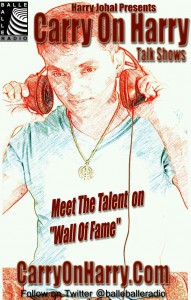
Tonight I got to shake hands with Ursula K. Le Guin!
/About a month ago, Sherman Alexie swore at me. Tonight I got to shake hands with another of my literary heroes, Ursula K. Le Guin. It's been a pretty amazing time, and it makes me wonder what's next. Will Margaret Atwood slap me? Will Cormac McCarthy kiss me on the forehead? Will the ghost of William Shakespeare appear in my room and command me to kill one of my uncles? I hope not. I love my uncles, but it would be hard to refuse an order from William Shakespeare. At the very least, I would dither, Hamlet-style.
 For those of you who are unfamiliar with her work, Ursula K Le Guin is probably most famous for her novels Lathe of Heaven and The Left Hand of Darkness, as well as her Earthsea fantasy series. She's won the Hugo Award twice and the Nebula Award four times (those are the biggest prizes for science fiction authors). She's won the National Book Award. Tonight I learned that the Library of Congress named her a "Living Legend" for her contribution to American literature. Not too shabby.
For those of you who are unfamiliar with her work, Ursula K Le Guin is probably most famous for her novels Lathe of Heaven and The Left Hand of Darkness, as well as her Earthsea fantasy series. She's won the Hugo Award twice and the Nebula Award four times (those are the biggest prizes for science fiction authors). She's won the National Book Award. Tonight I learned that the Library of Congress named her a "Living Legend" for her contribution to American literature. Not too shabby.
She's also an Oregonian, or, at least, she has been since she moved her in 1959. I think that qualifies her sufficiently. She came to the Civic Center in Dallas, Oregon, as part of the Literary Arts & Lecture series. This last year she won the Ken Kesey Award for Fiction, and part of the prize if that authors go around and give lectures throughout the state. I could imagine some authors resenting an award that came with an obligatory lecture tour, but if Ms. Le Guin resented it at all, she hid it masterfully.
Ms. Le Guin writes more than just science fiction and fantasy, and she showed off her range tonight by starting with some poetry, beginning with a poem written in sapphic stanzas (a 2500+ year-old form) followed by modern free verse. Then she read us a short story. As much praise as Le Guin has received for her novels, personally, I think her short stories are even more impressive. After the story, she answered questions from the audience. I selfishly asked two, both of which she answered generously, though with a bit less flair than Sherman Alexie. She was funny, sharp, and insightful about the writing process, her tastes, and the industry.
I managed to get a few of her quotes word for word:
- On archetypes: "It's not like you go looking for them. They come looking for you!"
- On her writing education: "I read a lot of good books. You learn what's worth imitating."
- On why she doesn't like complicated thrillers: "I finally learn who done it, and I hardly knew it was done."
After her talk, I made my way to the front and shook her hand before she could get mobbed by people who wanted her to sign their books. She probably thinks I'm a cheapskate, but I would have purchased another copy of Lathe of Heaven just to have her sign it if I'd brought the checkbook or they'd taken credit cards. I fought off the urge to tell her that I do have copies of her books in storage. That would have sounded like a back-handed compliment as much as a desperate defense, anyway. Instead, I just shook her hand. I'm sure she's already forgotten the moment, but I will treasure it and brag about it to anyone who will listen or read a long and frustratingly inconclusive blog post.
The Novel has Arrived in Seoul!
/I may be agnostic when it comes to the existence of the soul, but I now have photographic evidence that Seoul has my novel [Groan]! Okay, that pun was painful, but the picture is great. Thanks to Sharon and Hyon, the models in the picture, and thanks to Mary, Sharon's sister here in Oregon, who went above-and-beyond to connect our uncooperative email accounts. 
Sharon writes: "Here we are, my friend Hyon and I, in Seoul, South Korea, taking a break from a busy day of souvenir shopping. While resting, I was able to share and discuss a great book, The Sum of Our Gods, written by a fellow teacher, Benjamin Gorman, from Independence, Oregon. As you can see, we were so engrossed in our conversation about the book, that we were oblivious to the thousands of people passing by us on the busy street."
Review of Captain America: The Winter Soldier
/ Today my family and some friends made an event out of watching the first Captain America movie (well, the most recent reboot. Please forget this one. And this one. And this one.) and then going to see Captain America: The Winter Soldier. I won’t spoil the new one, but I can confidently say it was better than the first and worth your time.
Today my family and some friends made an event out of watching the first Captain America movie (well, the most recent reboot. Please forget this one. And this one. And this one.) and then going to see Captain America: The Winter Soldier. I won’t spoil the new one, but I can confidently say it was better than the first and worth your time.
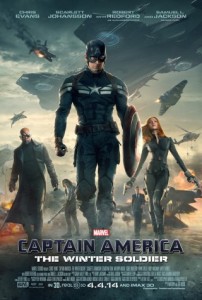 First, let’s revel in the fact that Chris Evans is one of the best miscastings of all times. His turn as Steve Rogers (Captain America) has not only made him very successful, but it’s had some surprise bonuses. For one thing, it’s redeemed his performance as The Human Torch in those painful Fantastic Four movies. I thought he was some Hollywood douchebag in those. Watching his Steve Rogers, I realize he was channeling something very real about Johnny Storm’s character: He was a douchebag. I would not have been surprised if the first actor to be cast as two different superheroes had been a woman. There tend to be a smaller pool of Hollywood “it” girls, while Hollywood treats its myriad wooden
First, let’s revel in the fact that Chris Evans is one of the best miscastings of all times. His turn as Steve Rogers (Captain America) has not only made him very successful, but it’s had some surprise bonuses. For one thing, it’s redeemed his performance as The Human Torch in those painful Fantastic Four movies. I thought he was some Hollywood douchebag in those. Watching his Steve Rogers, I realize he was channeling something very real about Johnny Storm’s character: He was a douchebag. I would not have been surprised if the first actor to be cast as two different superheroes had been a woman. There tend to be a smaller pool of Hollywood “it” girls, while Hollywood treats its myriad wooden 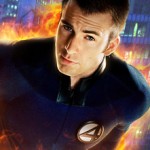 action-hero-types as interchangeable. The female characters in comic books almost always have the same body types, specifically ones no human woman possesses, so I expected Hollywood to find the closest woman to that vision and toss her all the female roles. When I first heard they were casting The Human Torch as Captain America, I thought they were making that mistake, which seemed to be more progressive than I’d expected but still an error. It turns out that this new role allowed Chis Evans to show he has some range. While Evans’ Human Torch was all feigned swagger on top of a layer of insecure human on top of a core of genuine but uninteresting heroism, Evans’ Captain America in anything but. He’s always throwing himself on grenades, tossing himself between gunman and their targets, leaping before he looks in order to save the day. His layer of uninteresting hero is on the surface. He clearly gets that part of the comic book’s character. The reason Chris Evans is miscast is that Steve Rodgers is a fundamentally boring character in the comic books, and I’m sure they could have found someone with an even more square jaw and crazy muscles to play the part in that boring way. (If anything, Evans is too buff for Steve Rogers, who wasn’t the most roided-out of all the characters in the Marvel Universe.) Instead, they picked an
action-hero-types as interchangeable. The female characters in comic books almost always have the same body types, specifically ones no human woman possesses, so I expected Hollywood to find the closest woman to that vision and toss her all the female roles. When I first heard they were casting The Human Torch as Captain America, I thought they were making that mistake, which seemed to be more progressive than I’d expected but still an error. It turns out that this new role allowed Chis Evans to show he has some range. While Evans’ Human Torch was all feigned swagger on top of a layer of insecure human on top of a core of genuine but uninteresting heroism, Evans’ Captain America in anything but. He’s always throwing himself on grenades, tossing himself between gunman and their targets, leaping before he looks in order to save the day. His layer of uninteresting hero is on the surface. He clearly gets that part of the comic book’s character. The reason Chris Evans is miscast is that Steve Rodgers is a fundamentally boring character in the comic books, and I’m sure they could have found someone with an even more square jaw and crazy muscles to play the part in that boring way. (If anything, Evans is too buff for Steve Rogers, who wasn’t the most roided-out of all the characters in the Marvel Universe.) Instead, they picked an 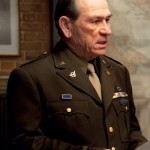
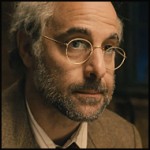 actor who can pull off a joke, something that was never particularly important in the Captain America comics. The Captain wasn’t the source of comic relief in the Avengers comics, either, but Evans can go toe-to-toe with actors with excellent comic timing in that franchise of films. In the original Captain America, he keeps up with Stanley Tucci and Tommy Lee Jones (the highlights of that film by far), and that’s quite an accomplishment. In this one, his banter with Anthony Mackie (Falcon)
actor who can pull off a joke, something that was never particularly important in the Captain America comics. The Captain wasn’t the source of comic relief in the Avengers comics, either, but Evans can go toe-to-toe with actors with excellent comic timing in that franchise of films. In the original Captain America, he keeps up with Stanley Tucci and Tommy Lee Jones (the highlights of that film by far), and that’s quite an accomplishment. In this one, his banter with Anthony Mackie (Falcon)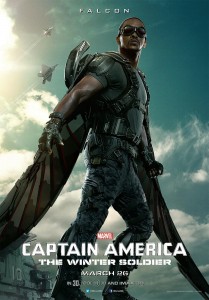 and Scarlett Johansson (Black Widow) shows more wit than the comics’ Steve Rodgers ever had. But Evans’ ability to pull off a joke isn’t even the best thing about his mis-casting. It’s the fact that he was cast as much to play the before-Captain-America Steve Rogers as the after version. He maintains the courageous weakling that the first film chose to focus on so heavily, and that carries over into this movie even as his central conflict shifts to that of a man questioning his loyalties and assumptions about his place in the world. Essentially, Chris Evans (and a good script) give Steve Rogers more layers than the comic book’s Captain America ever had.
and Scarlett Johansson (Black Widow) shows more wit than the comics’ Steve Rodgers ever had. But Evans’ ability to pull off a joke isn’t even the best thing about his mis-casting. It’s the fact that he was cast as much to play the before-Captain-America Steve Rogers as the after version. He maintains the courageous weakling that the first film chose to focus on so heavily, and that carries over into this movie even as his central conflict shifts to that of a man questioning his loyalties and assumptions about his place in the world. Essentially, Chris Evans (and a good script) give Steve Rogers more layers than the comic book’s Captain America ever had.
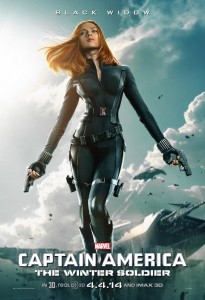 The Winter Soldier does a good job of not going overboard with the characters’ angst or the allegory. It uses Steve Rogers’ return to the waking world after seventy years trapped in the ice as a nice parallel for the soldiers returning home from modern wars, though Anthony Mackie’s turn as Sam Wilson, a soldier returning from Iraq or Afghanistan, makes that metaphor a lot more believable and less forced. The movie resists the urge to dwell on this too much, especially since it could have confused the situation if they’d tried to contrast this struggle of Rogers’ and Wilson’s with the character of The Winter Soldier. I won’t give away too much about him, but it’snot a spoiler to say that The Winter Soldier is not an appropriate allegorical equivalent of a soldier struggling to come home from war or one tempted by the potentially lucrative benefits of becoming a mercenary, since it’s made explicitly clear that he is not really returning from a war and that he’s not a willful mercenary cashing in on his super-warrior skills. The Winter Soldier is something else, and if this movie took itself too seriously it might have inadvertently made some more bitter critiques of returning American soldiers than this light Hollywood fare would ever dare touch.
The Winter Soldier does a good job of not going overboard with the characters’ angst or the allegory. It uses Steve Rogers’ return to the waking world after seventy years trapped in the ice as a nice parallel for the soldiers returning home from modern wars, though Anthony Mackie’s turn as Sam Wilson, a soldier returning from Iraq or Afghanistan, makes that metaphor a lot more believable and less forced. The movie resists the urge to dwell on this too much, especially since it could have confused the situation if they’d tried to contrast this struggle of Rogers’ and Wilson’s with the character of The Winter Soldier. I won’t give away too much about him, but it’snot a spoiler to say that The Winter Soldier is not an appropriate allegorical equivalent of a soldier struggling to come home from war or one tempted by the potentially lucrative benefits of becoming a mercenary, since it’s made explicitly clear that he is not really returning from a war and that he’s not a willful mercenary cashing in on his super-warrior skills. The Winter Soldier is something else, and if this movie took itself too seriously it might have inadvertently made some more bitter critiques of returning American soldiers than this light Hollywood fare would ever dare touch. 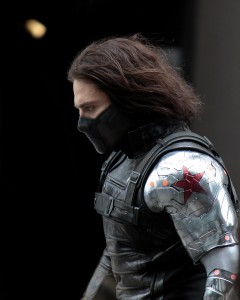 If there is any sharp allegory, it’s not connected to the returning soldier plot-line, but to the danger of the surveillance state. Even that is subtle enough that no one at the NSA is worrying this movie will inspire a great public outcry. It was nice to see characters who held nuanced positions on the subject though, rather than good guys who uniformly support Freedom and bad guys who support Tyranny. Even the movie’s ultimate head villain is revealed to be someone who does not cackle or think of himself as evil, just a pragmatist who thinks he’s doing what it takes to make the world better. Comic book villains too often lack believable motives, and it was particularly satisfying that a number of the movies heroes occupied spaces between Captain America’s and the chief villains, and could articulate those positions in persuasively.
If there is any sharp allegory, it’s not connected to the returning soldier plot-line, but to the danger of the surveillance state. Even that is subtle enough that no one at the NSA is worrying this movie will inspire a great public outcry. It was nice to see characters who held nuanced positions on the subject though, rather than good guys who uniformly support Freedom and bad guys who support Tyranny. Even the movie’s ultimate head villain is revealed to be someone who does not cackle or think of himself as evil, just a pragmatist who thinks he’s doing what it takes to make the world better. Comic book villains too often lack believable motives, and it was particularly satisfying that a number of the movies heroes occupied spaces between Captain America’s and the chief villains, and could articulate those positions in persuasively.
Of course, mostly The Winter Soldier was about cars crashing and bullets ricocheting harmlessly but dramatically off of surfaces very close to the heroes’ faces. There was also a lot of acrobatic fighting, well-choreographed and better edited than the first. (While watching that one, my nine-year old son noticed that there was a hard cut between a shot of Captain America swinging on a chain and a shot of him running without any hint that he’d landed at some point in between. Noah theorized that it was a deleted scene in an extended edition, which is both nerd-dorable and more generous than calling it a mistake.) The body count in The Winter Soldier is both disturbingly high and unrealistically low considering the number of bullets flying and cars crashing into one another. An argument could be made about Hollywood’s desperate need to up the stakes always resulting in conflicts that threaten complete world-wide disaster, but, if that’s a problem (it is), comic book movies are not the place to start rectifying it. In the source material, the entire world is imperiled multiple times each month. At least in this movie, no major downtown areas are destroyed just to show that the bad guys are, in fact, dangerous.
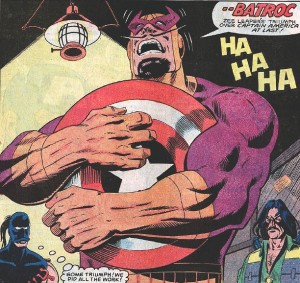 One last note from a comic book geek: It’s not a major spoiler to reveal that one of the villains in this movie is Batroc The Leaper, a character sometimes credited with being the lamest villain in the entire Marvel Universe. This movie did a great job of making him barely menacing and appropriately minor, a little shout-out to us old comic book fans that didn’t spoil the movie for people who are new to Captain America’s nemeses. I imagine that someone bet one of the screenwriters, Edward Brubaker, Stephen McFeely, or Christopher Marcus, that no one could ever get Batroc into a major motion picture, and that one of those gentlemen is now the proud owner of a crisp new five dollar bill. Well earned, sir!
One last note from a comic book geek: It’s not a major spoiler to reveal that one of the villains in this movie is Batroc The Leaper, a character sometimes credited with being the lamest villain in the entire Marvel Universe. This movie did a great job of making him barely menacing and appropriately minor, a little shout-out to us old comic book fans that didn’t spoil the movie for people who are new to Captain America’s nemeses. I imagine that someone bet one of the screenwriters, Edward Brubaker, Stephen McFeely, or Christopher Marcus, that no one could ever get Batroc into a major motion picture, and that one of those gentlemen is now the proud owner of a crisp new five dollar bill. Well earned, sir!
Bertrand Russell's "Ten Commandments"
/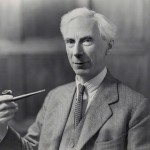 I just discovered this, and I love it. This is Bertrand Russell's "Ten Commandments."
1: Do not feel absolutely certain of anything.
I just discovered this, and I love it. This is Bertrand Russell's "Ten Commandments."
1: Do not feel absolutely certain of anything.
2: Do not think it worthwhile to produce belief by concealing evidence, for the evidence is sure to come to light.
3: Never try to discourage thinking, for you are sure to succeed.
4: When you meet with opposition, even if it should be from your husband or your children, endeavor to overcome it by argument and not by authority, for a victory dependent upon authority is unreal and illusory.
5: Have no respect for the authority of others, for there are always contrary authorities to be found.
6: Do not use power to suppress opinions you think pernicious, for if you do the opinions will suppress you.
7: Do not fear to be eccentric in opinion, for every opinion now accepted was once eccentric.
8: Find more pleasure in intelligent dissent than in passive agreement, for, if you value intelligence as you should, the former implies a deeper agreement than the latter.
9: Be scrupulously truthful, even when truth is inconvenient, for it is more inconvenient when you try to conceal it.
10. Do not feel envious of the happiness of those who live in a fool’s paradise, for only a fool will think that it is happiness.
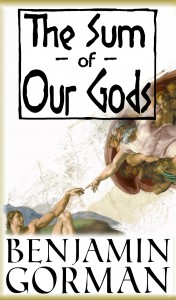 I wonder what Russell would think of The Sum of Our Gods. On the one hand, it revels in uncertainty and shows very little respect for authority. On the other hand, while it strives to tell the truth, it's the truth of fictional characters. Would Russell consider fiction to be "scrupulously truthful" or merely convenient?
I wonder what Russell would think of The Sum of Our Gods. On the one hand, it revels in uncertainty and shows very little respect for authority. On the other hand, while it strives to tell the truth, it's the truth of fictional characters. Would Russell consider fiction to be "scrupulously truthful" or merely convenient?
Review of Divergent
/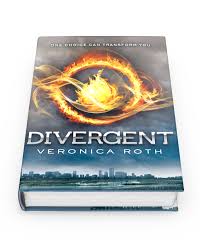 Today I read Veronica Roth's Divergent. All of it. In one day. I'm not a fast reader like my wife or some of my colleagues, so that feels like an accomplishment to me.
My verdict is ...mixed. The fact that it's a remarkably fast read doesn't really win or lose the book any points for me. I've torn through books before because they were so good I couldn't put them down. I also read Dan Brown's The Da Vinci Code very quickly, rolling my eyes every time he described Audrey Tautou's character as "incredulous," which was about 400 times. Roth's writing is certainly better than Dan Brown's, but that compliment feels more like an insult than I intend.
Today I read Veronica Roth's Divergent. All of it. In one day. I'm not a fast reader like my wife or some of my colleagues, so that feels like an accomplishment to me.
My verdict is ...mixed. The fact that it's a remarkably fast read doesn't really win or lose the book any points for me. I've torn through books before because they were so good I couldn't put them down. I also read Dan Brown's The Da Vinci Code very quickly, rolling my eyes every time he described Audrey Tautou's character as "incredulous," which was about 400 times. Roth's writing is certainly better than Dan Brown's, but that compliment feels more like an insult than I intend.
The world of Divergent is genuinely interesting and engrossing. I love dystopias, and the use of factions based on virtues is interesting. Calling the factions "factions" is a bit on-the-nose, but I can forgive that in YA. The choosing of the faction, though cliché, is also forgivable in a YA coming-of-age story. Whether it's the sorting hat or the Reaping or the shooting of a first deer, these moments are dramatic and speak to a longing in our culture for distinct coming-of-age rituals which we lack. I get that, and Roth handled that part just fine even if it wasn't unique. The protagonist, Tris, isn't sure whether she belongs in Slytherin Dauntless or Hufflepuff Abnegation, wrestles with the decision, and ultimately chooses a faction only to find that they are all flawed and none fit her perfectly. It works, and if it ain't broke ...well, a bit more creativity would be nice, but I can handle it.
Here's what is broken and which must be fixed. The narrator, Tris, is a gawky, accident-prone, scrawny, pretty (but not too pretty) girl who thinks she is ugly. Since she's the narrator, we are only exposed to her beauty by reading about all her self-doubts and then recognizing that they don't fit with the reactions of the boys around her who find her attractive. I can forgive Roth for drawing from the archetypal coming-of-age myths, but do we need another Bella Swann or Katniss Everdeen? Katniss is better than Tris in that she has confidence in her hunting ability and her role as the provider for her family. Tris has more pride than Bella Swann, but she even feels guilty about that pride. At least Tris doesn't have to get knocked-up by a guy who is more than a hundred years old on their honeymoon in order to discover her own self-worth by becoming a mother. Can we please stop telling teenage girls that, in order to be likable, they have to have unrealistically low opinions of themselves? This trend can't be good for anybody.
It's difficult to read around a protagonist who is unlikeable, but the other characters kept me going. Tobias/Four, the love interest, is genuinely interesting and somewhat complicated, at least until his unswerving adoration of Tris becomes clear. Then he just becomes a realistic swooning teenage boy, and that's bearable, too. Considering his backstory, he could have been a lot more insufferable in his brooding. Points for Roth on that.
And why present tense? Writers, listen to me! Present tense is great for action sequences, so I can see why it appeals to people who are setting out to write fast-paced, action heavy books. If you have any sense that the time period covered by the book will extend for any prolonged period of time, resist this temptation, especially if the book is written in first person. Learn from Suzanne Collins' mistake. After a second reading, I have grown to like Mockingjay, the third Hunger Games book, but I completely understand why it gets such mixed reviews from my students. In The Hunger Games trilogy. the first book happens over the course of a handful of days, so the present tense works. The second book happens over the course of a couple weeks, so it works, but slightly less well. The third covers a much longer period of time, but Collins couldn't switch because she'd painted herself into a corner. Unless you can maintain the urgency of an action scene for the whole series (which would probably be exhausting for the reader and would lead to a lot of blunt exposition at the expense of more beautiful prose), don't make this mistake. Better yet, write the thing in one tense, then rewrite it in another and see which works better. I suspect that, most of the time, you'll find that the demand for intensity is overbalanced by the fact that we naturally tell stories in the past tense in our daily lives, so this compulsion to haste leads to a stiff, awkward writing style.
The most interesting element of Divergent is the mystery of how this seeming-utopia is breaking down and what that says about the virtues which under-gird it. We really only get to see that starting to play out in the last third of the book, so I'll read the sequels to see if the series gets deeper into those questions of values and motivations. Also, my wife says Tris gets more likable. Color me skeptical. Still, I have to remind myself that The Lightning Thief, the first book in the Percy Jackson series, was painfully derivative of Harry Potter, but the series found its own way in the second book and ended up being pretty great by the end. Maybe the Divergent trilogy will find its own path and break free from some of the more well-worn elements of YA fiction in the second and third book.
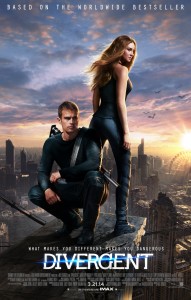 I admit I'm very curious to see how they handle the severity of the book's violence in the film, so I'll be checking that out, too. My prediction, a largely bloodless version of a bloody, savage story. Hopefully my low expectations will cause me to be pleasantly surprised. Those who've seen the movie, are the directors really bold enough to make the audience sit through multiple beatings that continue until one of the participants is an unconscious, bloody pulp? I would respect that for both its faithfulness to the book and its audacity, but it doesn't sound like a lot of fun, and it would certainly upset some parents. How far do they go? Far enough? Too far?
I admit I'm very curious to see how they handle the severity of the book's violence in the film, so I'll be checking that out, too. My prediction, a largely bloodless version of a bloody, savage story. Hopefully my low expectations will cause me to be pleasantly surprised. Those who've seen the movie, are the directors really bold enough to make the audience sit through multiple beatings that continue until one of the participants is an unconscious, bloody pulp? I would respect that for both its faithfulness to the book and its audacity, but it doesn't sound like a lot of fun, and it would certainly upset some parents. How far do they go? Far enough? Too far?


